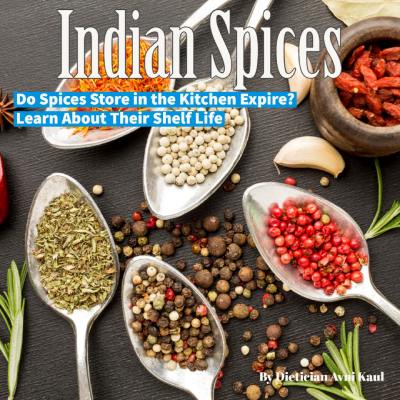Dietician Avni Kaul Talks about the Shelf-life of Common Spices that we Keep in Kitchen Cupboards and when we Need to Throw them.
Spices are an essential component of culinary creations, adding flavor, aroma, and depth to our favorite dishes. They have been used for centuries to enhance the taste and appeal of various cuisines around the world. However, it is important to understand that spices, just like any other food product, have a limited shelf life. In this article, Delhi’s leading Dietician Avni Kaul discusses the shelf life of spices and provides some tips on how to ensure their freshness and potency.
Understanding Spice Shelf Life
Unlike perishable foods, spices do not spoil or become unsafe to consume. However, their flavors and potency can diminish over time, resulting in less flavorful dishes. The shelf life of spices can vary depending on various factors, including the type of spice, storage conditions, and whether they are whole or ground.
Whole Spices
Whole spices, such as whole cloves, cinnamon sticks, or whole peppercorns, tend to have a longer shelf life compared to ground spices. When stored properly, whole spices can retain their flavors for up to three to four years. It is advisable to buy whole spices in small quantities and grind them as needed to preserve their freshness.
Ground Spices
Ground spices, including commonly used ones like paprika, cumin, or turmeric, have a shorter shelf life compared to whole spices. They typically retain their flavors for about one to three years, depending on the spice and storage conditions. Ground spices have a larger surface area exposed to air, leading to quicker oxidation and flavor loss.
Storage Tips for Maintaining Spice Freshness
Proper storage plays a vital role in maintaining the quality and freshness of spices. Here are some tips to ensure your spices remain flavorful for longer:
- Store in Airtight Containers: Transfer spices to airtight containers, such as glass jars with tight-fitting lids, immediately after purchase. This helps to protect them from moisture, air, and light, which can degrade their flavors and potency.
- Keep Away from Heat and Light: Store spices in a cool, dry place away from direct sunlight and heat sources like stovetops or ovens. Exposure to heat and light can accelerate flavor loss and diminish their quality.
- Avoid Moisture: Moisture can cause spices to clump or develop mold. Keep spices away from steam, condensation, and areas of high humidity, such as near the sink or dishwasher.
- Do not Store Above the Stove: Heat and moisture from cooking can impact the quality of spices. Avoid storing them directly above the stove or other heat-emitting appliances.
Label and Date: Properly label your spice containers with the name and date of purchase. This helps you keep track of their freshness and rotation, ensuring you use the oldest spices first.
When to Replace Spices
While spices don’t necessarily go bad, their flavors diminish over time. It is a good practice to replace spices that are past their prime to maintain the quality of your culinary creations. If your spices lack aroma, appear dull in color, or taste bland, it is an indication that they have lost their potency and should be replaced.
Spices are an integral part of cooking, but it is important to be mindful of their shelf life. By storing spices properly and being aware of their freshness, you can ensure that the flavors and aromas they impart to your dishes are at their best. Regularly check your spice collection, discard any old or flavorless spices, and replenish them to enhance your culinary adventures. Embrace the world of spices, and let their vibrant flavors elevate your meals to new heights.



